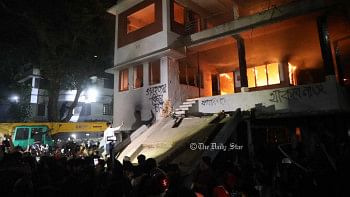We were complicit by our silence

In a country where a sense of freedom has barely returned after over a decade of suppression, the question of a writer's role looms large.
Do writers have a duty to speak the truth, to be the voice of the people, and to stand for the country when freedoms are curtailed?
This question took center stage at a recent gathering of writers, poets, and intellectuals at The Daily Star Centre in the capital.
As part of the "36 Days of July – Saluting the Bravehearts", the discussion, "Abbhutthan Poroborti Lekhoker Daay (The responsibility of writers after the uprising)", delved into what it means to be a writer in the wake of the July uprising.
Poet and publisher Monirul Monir posed a question that cut straight to the heart of the issue: "Did we, as writers, do our duty? Did we speak the truth when it mattered the most during the fascist regime? Now that we have a semblance of freedom, do we have a plan for how to stand up to oppression?"
His questions exposed a troubling reality: a divide among the intellectual class, many of whom remained silent during the most critical moments.
For Monir, the link between artistic expression and civic duty is clear. "If I don't speak as a poet or writer, how can I expect to live as a free citizen or even call myself a writer or poet?"
Author Mohammad Nazimuddin, renowned for his novel "Rabindranath Ekhane Kokhono Khete Ashenni", said, "As writers, we knew what was happening. We knew the narratives the government was feeding us were false, and yet we didn't challenge them. Where was our sense of duty then? We betrayed our role as the voice of the people."
He argued that extremism was not confined to political or religious factions -- it had infiltrated the intellectual elite class as well.
"Some of us, the so-called liberals, became silent collaborators of the regime's agenda. We were complicit by our silence, by choosing not to speak out."
This idea of complicity through silence was echoed by Afsana Begum, director of Jatiya Grantha Kendra. "Writers are the mirrors of society. We owe it to our future generations to write the truth, to record what is happening in real time, and to create a platform for debate, discussion, and understanding."
For her, the role of writers is clear: they are the voice of their people, and that voice must never be stifled -- neither by external forces nor by internal self-censorship.
"We must not censor ourselves," Begum insisted, "Especially in times of crisis. If our writing doesn't provoke, challenge, and spur debate, then we have failed in our duty as writers."
Lyricist Shahidullah Faraizee paid tribute to the martyrs of the July Uprising, noting the courage shown by even the youngest of protesters.
"Children, students died to protect our freedom. How could we, as writers, stand by and not write for them? How could we be silent when they gave their lives for a cause we should have been leading?
"It's better to die in the front lines than live with the shame of having done nothing."
Faraizee's call for a clear framework of action was mirrored by others at the discussion, including Sayeed Ferdous, vice chancellor of Bangladesh Open University.
While acknowledging the atrocities of the past, Ferdous urged a focus on the future, advocating for a rigorous self-examination among intellectuals. "It's easy to write against visible enemies, but what about the hypocrisy within ourselves? We've become so fearful, so compromised by our own greed and cowardice, that we lost our voices. We need to confront this internal duality -- the part of us that conforms to power rather than speaking truth to it."
Litterateur Ahmad Mostafa Kamal reflected on the power of the people during the aftermath of the regime's fall.
In the days following the Sheikh Hasina government's ouster, the country was left without formal law and order over than three days.
Kamal pointed out, "There was no chaos. The people protected each other. This shows that we, as citizens, are capable of safeguarding our nation. We must never allow fascism to take root here again."
Educationist Wakil Ahmed, who presided over the event, concluded the discussion by stressing the importance of writers in the mass uprising. "The success of this revolution lies in the narrative we write for the future."
The discussion was conducted by Emran Mahfuz, sub-editor of The Daily Star Bangla.


 For all latest news, follow The Daily Star's Google News channel.
For all latest news, follow The Daily Star's Google News channel. 







Comments